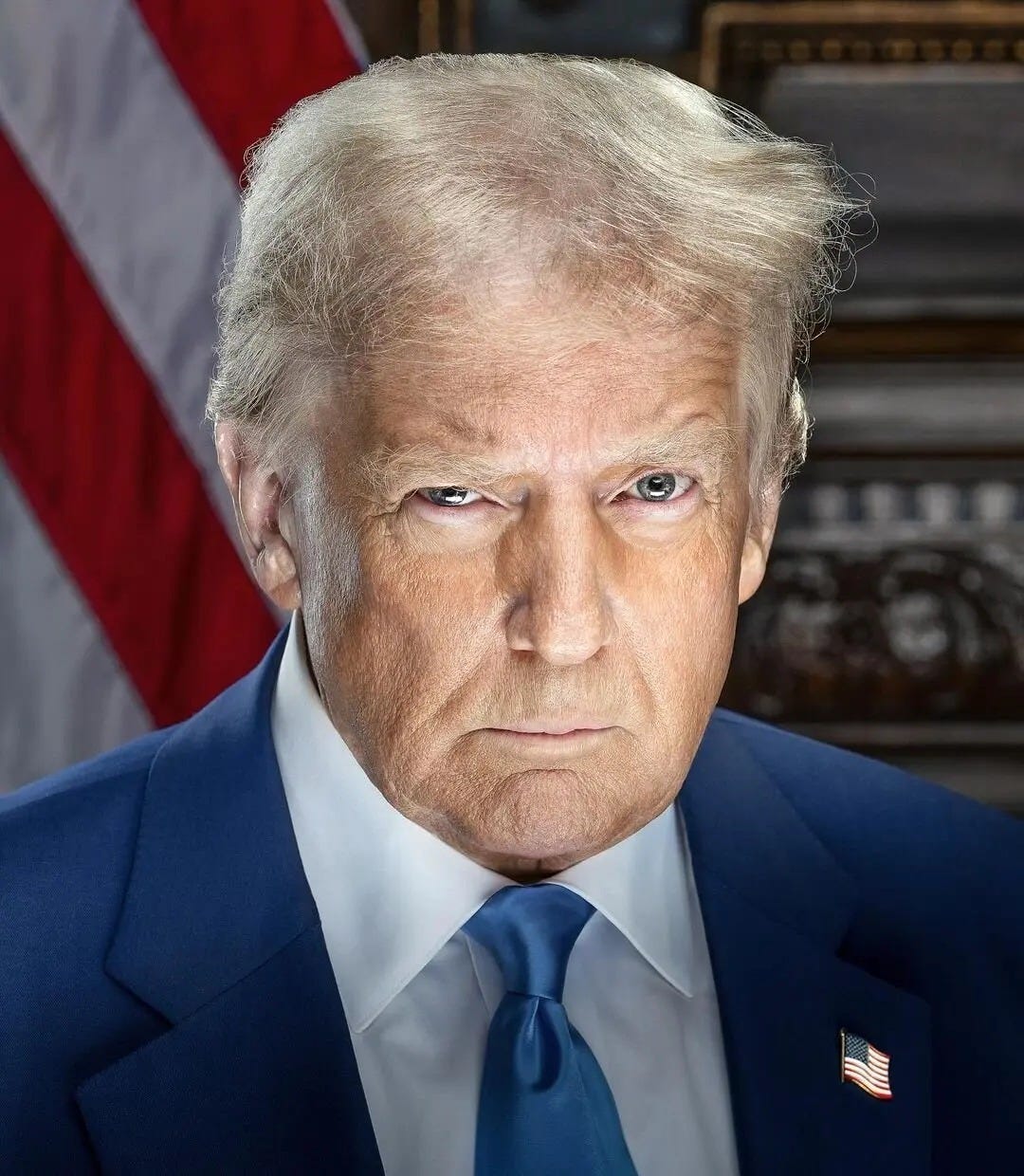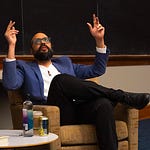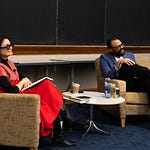We were thrilled to have the opportunity to talk to PEN America’s Jeremy Young about what a second Trump administration holds in store for higher education. It was an informative—and sobering—conversation. Over the next four years, we should be prepared for a cascade of ideologically-driven threats to academic freedom, campus free expression and the basic integrity of higher education. (Breaking news as of January 22: Harvard adopts the International Holocaust Remembrance Alliance of antisemitism. Jeremy explains why this is a mistake at 14:34.) If you would rather read than listen, there is a transcript attached below.
Show Notes
PEN America’s *Educational Censorship* page is a terrific resource
On Christopher Rufo, see Benjamin Wallace-Wells, “How a Conservative Activist Invented the Conflict Over Critical Race Theory,” New Yorker, June 18, 2021 and Michael Kruse, “DeSantis’ Culture Warrior: ‘We Are Now Over the Walls,’” Politico, March 24, 2023. For Rufo’s take on critical race theory, in his own words, see this YouTube video.
Here is the full text of Executive Order 13950, which became the template for most of the anti-CRT (or “divisive concepts”) laws passed in red states.
On the Stop WOKE Act, the marquee anti-CRT law signed into law by Florida Governor Ron DeSantis in 2022, check out these two Banished episodes:
Jeffrey Sachs and Jeremy Young predict the future: “For Federal Censorship of Higher Ed, Here’s What Could Happen in 2025” (PEN America, January 2, 2025). Also very much worth reading are the predictions of UC Riverside sociologist Steven Brint: “If Trump Wins…” (Chronicle of Higher Education, March 6, 2024)
For more on the phenomenon of “jawboning,” see this page from FIRE and this page from the Knight First Amendment Institute
On “anticipatory obedience,” see this excerpt from Timothy Snyder’s 2017 book, On Tyranny
On legislative challenges to campus DEI, see the Chronicle of Higher Education DEI Legislation Tracker. (We are quite skeptical of many conventional DEI efforts but state bans are a cure that is far worse than the disease)
For a deeper dive on accreditation, see Eric Kelderman, “Trump’s Vision for College Accreditation Could Shake Up the Sector” (Chronicle of Higher Education, November 26, 2024)
On Title VI investigations by the Office of Civil Rights, see Zach Montague, “Campus Protest Investigations Hang Over Schools as New Academic Year Begins” (New York Times, October 5, 2024). See also this piece from the Harvard Crimson: “One Day After Trump Takes Office, Harvard Settles Two Antisemitism Lawsuits”
Here is the International Holocaust Remembrance Alliance definition of antisemitism. Kenneth Stern, one of the definition’s main authors, explains why he is concerned it is being used to promote campus censorship
On the prospect of a much heftier endowment tax for the country’s wealthiest institutions, see Phillip Levine, “How Trump Could Devastate Our Top Colleges’ Finances” (Chronicle of Higher Education, January 13, 2025). Levine addresses the normative question—should college endowments be taxed?—here.
Transcript
Jeff: So, we're looking forward to a second Trump administration.
Jeremy: Are we looking forward to a second Trump administration?
Amna: No…towards.
Jeff: We are anticipating…I personally am dreading a second Trump administration.
Amna: This is Banished and I'm Amna Khalid, along with my colleague Jeff Snyder. Jeff and I were delighted to have the chance to catch up with PEN America's Jeremy Young at the recent American Historical Association conference in New York City. He's one of the most informed and astute analysts of government driven censorship in higher education today. We started by asking him to tell us a little about PEN America.
Jeremy: PEN America is a 102 year old organization that exists at the intersection of literature and human rights. It is one of 140 PEN centers around the world which are in a loose network of PEN Centers governed by PEN International. PEN America's mission is to celebrate literature and defend the freedoms that make it possible, of which two of the foremost are academic freedom and freedom of expression.
Amna: And what's your specific role?
Jeremy: I am the Director of State and Higher Education Policy at PEN America, which means that I oversee our Freedom to Learn program, which leads actions and responses to educational censorship legislation, largely from the state governments, but also from the federal government. Things like DEI bans, critical race theory restrictions, and various other types of restrictions on faculty governance and university autonomy.
Amna: We're eager to hear your predictions on what the higher ed sector should be bracing for with the second Trump administration. But first, Jeremy, could you please remind us of the nature of the attacks against higher education during Trump 1.0?
Jeremy: In the summer and fall of 2020, this really happened late in the first Trump administration, there was a national panic around critical race theory, and this was created by Chris Rufo and some others really as a response, a backlash, if you will, against the George Floyd protests, the Black Lives Matter movement, the popularity of the 1619 Project, and so on, this sort of moment of racial reckoning. And so Rufo and others (Rufo is a fellow at the Manhattan Institute) decided to use this term critical race theory, which of course is an academic term with a particular set of meanings but to, as he put it, decodify and recodify it, essentially weaponize it to mean things that weren't all that connected to the actual theory of critical race theory and were really just a sort of catchall for criticisms of DEI and other race-based pedagogies and ideas. And so Rufo was able to convince president Trump to issue an executive order 13950 called Race and Sex Stereotyping that laid out a list of nine divisive concepts which bore some passing resemblance to critical race theory, but really were vague, and general, and banned all sorts of practices related to race, gender, and identity, and ideas related to race, gender, and identity that were unclear and difficult to interpret. Originally, this was a restriction aimed solely at trainings in government agencies…the executive order never went into effect. It was stayed by a court and repealed on the first day of the Biden administration. But that language of the divisive concepts then began to appear in state legislatures aimed now squarely at education. At first, at K-12 institutions primarily, and over time, higher education became more and more of the target.
In 2023, we started to see a shift toward sort of broad spectrum attacks on higher education, moving away from some of the direct speech restrictions of the critical race theory bans, in part because of court cases that had gone adversely for those restrictions, and instead restricting broad swaths of university governance, including DEI offices, the ability of a university to manage diversity work on its own as a sort of shared governance function, tenure restrictions on faculty governance, restrictions on curriculum, which I think are going to be very prominent in 2025.
Amna: You mentioned backlash to the 2020 racial reckoning as a key factor driving the anti-CRT movement. Can you say something more about where this opposition to CRT and now DEI is coming from?
Jeremy: I think that there are several causes that are inseparable from one another. I think there are people who actually do want to restrict those particular ideas on campus, who want to advance a sort of triumphalist Western canon narrative of America as the victor, and they're just very opposed to any discussions that paint the United States in any way that is not hyper-patriotic and perfect. There's absolutely some racism, some sexism, some, some discrimination, discriminatory bias that's involved.
I also think that there is a real desire to simply crush university power that I think comes out of the educational realignment that we have seen over the last 10 years. Kamala Harris won college educated Americans by 14 points, and four years ago, Joe Biden won them by four, and prior to the 2016 election, there was essentially no difference between the parties, really, at any time in American history on the axis of college education. There is now a sense I think among some conservative forces that instead of the long-time conservative project of reforming universities, having more viewpoint diversity, think of the Koch Centers in various institutions. Instead they're a place where liberals go to get educated, so we should just crush them, right? So I think that's part of it. It's just the goal of taking away universities’ autonomy on everything is a key component.
And the third component is political gain. And that is the one that has fluctuated the most over this period. Glenn Youngkin won a come from behind victory running on criticizing critical race theory in K-12 schools. And Steve Bannon said in 2021, I think about critical race theory and I see 50 new House seats in the midterm elections. Now, when that didn't happen, I think it began to become clear that these attacks are not as salient as they were thought to be. I think in 2023 and 2024, there was a real move away from that, especially with, also with the collapse of the DeSantis presidential campaign, which was built entirely around this idea of him being, fighting the war on woke. There was a sense that, maybe you still want to do these things, but now it's going to be quiet, it's going to be stealth mode, because there's no political gain to be gotten from having a big press release around this, around the Stop WOKE Act. But the other two motivations, the motivation of restricting certain ideas about race; and the motivation of smashing the power of higher education, those have remained constant.
Jeff: Very succinct and helpful. Thank you. You and your colleague Jeffrey Sachs recently wrote an informative and sobering piece about Trump’s plans for higher ed in 2025 and beyond. Maybe you could tell us a little about your key predictions. The first one you mention is jawboning. What is jawboning and why should we be worried about it?
Jeremy: Jawboning, put simply, is when government officials, instead of passing a law requiring someone who isn't a government official to do something, they simply browbeat or bully or threaten them into doing it. In some ways you can look at the congressional hearings as a form of jawbonings or making threats against presidents at Columbia and Harvard and so on. But the classic example is actually what we're seeing at the state level where lawmakers are simply going to university presidents and say, saying, okay, we're not going to pass a DEI ban or a curriculum restriction. We're going to simply request that you make one on your own or we'll cut your funding. Or we'll pass one next year that's worse than anything you could imagine. It's a very intimate form of censorship, right? It takes restrictions out of the legislative process where they can be challenged at a hearing; out of the judicial process where they can be challenged on constitutional grounds; and every single one of these bills has at least some constitutional infirmities. And instead makes it just a threat, right? We're gonna cut your budget. What are you gonna do about that? It's a very difficult position for presidents to be in because they don't have a lot of leverage.
Jeff: I think it was Yale historian Timothy Snyder who coined the term anticipatory obedience. He said it was a dynamic that's often seen under conditions of rising authoritarianism. So you've got individuals and groups that start to make concessions they think will appease the powers that be. Is there a connection here to jawboning?
Jeremy: Yes, so we talk about over compliance and pre-compliance. We're not going to comply with the letter of the law, we're going to comply with the spirit of the law. There is a law in Alabama that passed in 2024 that restricts some elements of DEI, but does not actually ban outright the DEI offices. And every university in Alabama has treated it as though it is an outright ban. And that's significant, in particular, because of the nature of these laws. You know, you go look at a set of statutes in a state legislature or the federal government, what you'll notice is that most laws are very precise. Think about traffic laws. What are you allowed to do on the road? It's very specific. You can drive this many miles an hour this particular way. There's no room for interpretation. There's no room for judgment because the goal is to make you comply with the law. These laws are intentionally vague. They ban broad swaths of ideas which are never defined in the laws.
What does it mean to say, for instance, one of the divisive concepts, to say that you're not allowed to say that the United States is fundamentally racist. What does that mean? It doesn't say in the law what that means. It's left up to your interpretation, which means whoever is going to enforce that law gets to decide whether you violate it. That is actually a constitutional violation. It's against the 14th Amendment. And while the courts have found all sorts of infirmities with these laws, that's the one they've found the most consistency. Not freedom of speech, not racial discrimination but vagueness. So over-complying with a vague law is, it's difficult to avoid because these laws lend themselves to over-compliance because they're so vague. But it's also vitally important to avoid doing that.
The other thing that we see is pre-compliance, which is just imagining that the legislature is going to pass a law but then whether or not they do it. We intervened with the Western Association of Schools and Colleges, one of the seven accrediting bodies because they were basically enacting what a restriction in Project 2025 that would have forbidden them to have a DEI standard for universities they accredit. And just doing it preemptively.
It's not clear whether the education department is able to pass that restriction without legislation. And it's not clear whether legislation or the regulation would survive a court challenge. And they're just saying we'll just take it out. That's pre-compliance. You don't want to do that. And what we argued successfully, is that, again, even if you don't think an accreditor should have a DEI standard, we don't take a position on that. The worst time to get rid of your DEI standard is one month before a new administration that's promised to ban it tells you to. That's the moment when you put up your back and say, no, we're not going to comply with this.
Jeff: Jeremy, tell us a little bit more about the new Trump administration's plans to disrupt the conventional work of accreditors.
Jeremy: So higher education institutions are accredited by one of seven accrediting bodies, six of which have historically served certain regions, but now under new federal regulations the university can work with any of the seven accreditors. But they still tend to be concentrated in regions.
Accreditation is really the only thing that separates a real substantive university from a diploma mill; and the way that accreditation is enforced, is that the Department of Education will only provide federal student financial aid, which 55 percent of all students receive, to schools that it recognizes as legitimate accreditors, which currently is those seven institutional accreditors. They are private or nonprofit organizations. They're run by academics. They have their pluses and minuses, but they are pretty much the guarantor of institutional quality in higher education. And if you look at Project 2025, everything that they say they want to do to higher education is focused on accreditation. They have identified these accreditors as the soft underbelly of higher education. And the simplest thing that they want to do and that they probably will at least try to do is to ban accreditors from having DEI standards, of which six of the seven currently do.
But they really want to go further. What they really want to do is to undermine the system of accreditation itself by allowing any jurisdiction, any state, to either charter its own accreditor or serve as its own accreditor. So Ron DeSantis could become the accreditor for all universities in Florida. And now instead of those universities having DEI offices, he can say you cannot be accredited in the state of Florida unless you've banned DEI and basically instituted a classical curriculum, a Hillsdale style classical curriculum. It’s a little more complicated than project 2025 makes it sound. Our analysis is that while they may attempt to do it through regulatory action, the process of negotiated rulemaking in the Department of Education is sufficiently complex that it would probably stop them from doing it and so that probably means that they need legislation to change the Higher Education Act, which would be subject to a filibuster.
So this is something that we will be watching to see if they try to do it administratively. It may not be possible. And we'll also be watching if they try to slip it into one of those reconciliation bills that are being proposed that would be able to go through without a filibuster.
Jeff: So that's how the accreditation system might be weaponized. You and Sacks also identify Title VI enforcement by the Office of Civil Rights as a key area of concern. Maybe we can break this down into its component parts. What is the Office of Civil Rights and what's Title VI?
Jeremy: Sure. So the Office of Civil Rights is an office within the Department of Education that ensures that educational institutions meet the requirements of the various civil rights laws. It covers Title VI funding, which is funding that is tied to financial aid for universities, and it makes sure that institutions that are receiving federal financial aid are following these civil rights protections. It is an office does good work and we have a good relationship with the office.
We have some concerns about the way that the Biden administration has been investigating and enforcing agreements with universities around antisemitism. We expect things to get far worse in the new administration. We expect that any university that has any sort of protest or any faculty member who expresses pro-Palestinian views is going to be investigated and sanctioned by the Office of Civil Rights. We expect they're going to launch lawsuits. They're going to really go after universities. So it is an office that is going to be used in some really aggressive ways to restrict speech on campus.
Jeff: In terms of restricting speech, you and Sachs are especially worried about the trend on the part of colleges and universities, not to mention states and the federal government, to adopt the International Holocaust Remembrance Alliance definition of antisemitism. Why is this so concerning to you both?
Jeremy: So the International Holocaust Remembrance Alliance definition of antisemitism is a very interesting document. It starts with a description that is quite thoughtful and then it gives a list of examples of things that could be forms of antisemitism or could accompany antisemitism, and that list includes things like singling out the state of Israel for special criticism that other states are not singled out for that do engage in the same actions or just you know criticizing Zionism, things like that. Which in the context of what that definition was designed for yes, sometimes when you see those statements, it's worth perking your ears up and asking, is this accompanying antisemitism or not?
What the laws are doing, and this comes from a model bill that the Goldwater Institute wrote in 2016, and it's now being suffused into all these federal and state policies, is to take those examples of possible antisemitism and change it from possible to definite antisemitism. So anytime you criticize the state of Israel, it's antisemitism. And then writing that into law, saying that universities have to treat this as any instance of this broad definition of antisemitism as hate speech or as a form of harassment. The author of that definition, Kenneth Stern has repeatedly said that it is not designed to be used in that way. In fact, he said it's unconstitutional to use it in that way. And yet that's what we're seeing. So that's the concern. It's not that you shouldn't have a definition of anti Semitism, although I will say our statutes tend not to define particular types of hate speech because it's too subjective, right? This is the reason that we have definitions like severe, pervasive, and targeted for harassment. You're looking at a pattern of behavior because each individual case is protected by free expression.
Jeff: I understand that the Office of Civil Rights is currently conducting dozens of Title VI investigations stemming from campus protests over the war in Gaza. There are widespread allegations of antisemitism, many of which are accompanied by competing charges of Islamophobia. How do you think we should make sense of this?
Jeremy: These are complex situations. Lots of universities are getting them wrong. Some universities are being overly censorious, some not enforcing harassment protections. And it's right and proper for OCR to investigate these things. The problem is that they are not always coming up with the right findings. That they're not always protecting free expression, balancing free expression adequately with the need to protect students from harassment. We're seeing universities implement draconian time, place and manner restrictions on speech. So just the fact that OCR and the Congress are making all these threatening noises about restricting speech leads a lot of universities to do the censor's work for them.
Amna: Jeremy mentioned one other thing the new Trump administration has made ramblings about, which is ramping up the endowment tax on the country's wealthiest institutions. Please see an informative Chronicle of Higher Education article by Philip Levine, linked in the show notes.
What all these attacks or interventions, depending on your point of view, have in common, is that they seek to undermine the autonomy of colleges and universities. Here's Jeremy.
Jeremy: University autonomy is not a principle that is very widely understood in the United States. It's much more common in Europe where there's an autonomy index and all sorts of things as a way of protecting academic freedom. But it's a vital component of academic freedom. We think about academic freedom in the U.S. primarily as being the freedom of an individual faculty member to speak their mind or to engage in their research or teaching. But, in reality, that freedom can only be protected so long as the people overseeing it, the university administration, are free from the ideological control of the government. The key here is ideological control. We aren't saying that the government doesn't have a budgetary responsibility to oversee the university, or that there isn't a role for the government in community relations, or student success, or access and completion, or any of these things. But when it comes to ideas, what ideas can be present on a campus, whether it's in the classroom, whether it's in a DEI office, anywhere on campus, that is not the government's business, and it cannot be the government's business, or ultimately everyone on campus is simply going to be currying favor with whatever political party is in charge.
Amna: Jeremy, this has been wonderful and you've been so kind to give us so much time. Thank you.
Jeff: Thank you. It's an absolute pleasure.
Amna: That was our conversation with Jeremy Young of PEN America on what Trump 2.0 portends for higher education. As of yesterday, Trump's second term has officially begun. Keep your eyes peeled and ears tuned for what's to come next. If you liked what you heard today, be sure to help us spread the word about Banished, and don't forget to comment and rate this show.
Once again, this is Banished, and I'm Amna Khalid, along with Jeff Snyder. Until next time.















Share this post